Election
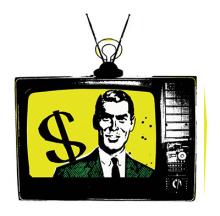
AS ONE OF the few white males who has not declared his candidacy for president, I’m actually enjoying the relative calm before the upcoming election season. Our television shows are still punctuated by soothingly predictable commercials about luxury cars and erectile dysfunction. In a few months they’ll be railing against job-killing gay marriage and the evils of climate science, also job-killing, followed by the reassuring voice of a man who says “I apologize for this message.” (Kidding. But wouldn’t that be great?!)
At this point, with little at stake, the legions of Republican candidates are of interest only for their entertainment value, their speeches lacking in substance but their repetitive talking points ripe with possibility for drinking games. (Caution: When listening to Ted Cruz, don’t choose the words “constitution” or “unadulterated judicial activism” if you’re the designated driver.)
We’re at that sweet spot in time when Iowa is just a state known for its agricultural products (corn, I think), and when Hillary Clinton has not yet been compared to Hitler. If we think about politics at all, it’s to come up with reasons not to support Bernie Sanders. Because, if you set aside the oddity of a Vermont senator who still sounds like the Flatbush of his youth, there’s only one reason: his age. He’s 73, six years older than Hillary Clinton and decades older than Donald Trump, who is, like, 12, right?
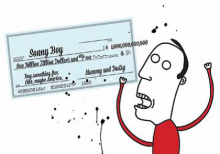
WITH THE NEXT election still almost 18 months away, you’d think the media would focus on more important topics in the meantime, such as where Kim Kardashian is spending her next vacation.
But you’d be wrong. It’s officially time for the press to ignore more newsworthy subjects in favor of endless coverage of the election “horse race,” but without the legendary good sense horses bring to such occasions.
ISIS on the move, taking the Middle East back to the 7th century? Forget that. Let’s talk about Jeb Bush’s 2016 run, although the hook could be how ISIS reminds people of the disastrous policies of the last Bush in the White House. Or was it the one before that? I can’t remember. (In hindsight, the Bush parents should have named alltheir sons George, so presidential ballots could be printed in bulk, enough for several elections.)

IT’S A LITTLE early to be looking back at the past year, but I have to say I’m very disappointed in 2014. It was supposed to be the Year of the Cicada, a time when millions of fat little bugs would emerge from the ground and loudly buzz around the nation’s capital, possibly joining the chorus to impeach the president. (The cries for impeachment haddeveloped a definite bug-like drone.)
Every 17 years or so, the cicadas are supposed to emerge from the ground where they have been gestating and, for the first week of their debut, bring a welcome distraction to life’s problems. By week two, however, they’ve become life’s problems, striking your head and other body parts as you walk outside, or even inside if you leave the screen door open too long for a cat who just ... can’t ... decide.
Fortunately, they all die after a couple weeks, but then venturing out into your backyard sounds like walking on corn flakes, if corn flakes were green and disgusting, and dead.
But none of that happened this year. Instead of the fun and natural wonder of watching bugs freeing themselves from their dark captivity and flying forth into the glorious light of day, we got nada.
No sitting on the front porch watching cicadas celebrating their new world or becoming lunch to passing birds, whichever comes first; no entomological moment of awe; no opportunity to provide learned commentary on nature’s brutal cycle of life to a wide-eyed grandchild. (“So that’s why you should stay in school and not take drugs.”)
IN THIS YEAR'S midterm elections, hundreds of thousands of Americans will have a much more difficult time casting their ballots than they did two years ago. And it won’t be because of rain, or early winter snows, or other acts of God.
It will be because powerful people don’t want them to vote.
Why? They stand to gain politically if the “wrong” people can be kept away from the polls. It’s the opposite of a “get out the vote” campaign—“keep out the vote” describes it better.
The tradition of keeping particular sectors of the population from taking part in the franchise goes back to the founding fathers. John Adams, for instance, believed that only rich, successful, smart people should vote—and only people of a certain race and gender, of course.
“Such is the frailty of the human heart,” Adams wrote in May 1776, “that very few men who have no property have any judgment of their own.” At the time, politicians in Massachusetts wanted to allow men who didn’t own property to vote. Adams thought that was a bad idea. For him, no property meant no vote.
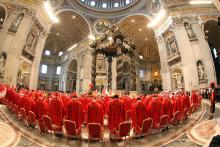
VATICAN CITY — The doors of the Sistine Chapel closed behind the cardinals on Tuesday, marking the official start of the conclave that will elect the successor to Pope Benedict XVI.
The 115 cardinal-electors walked in procession into the Sistine Chapel, singing hymns and invoking the Holy Spirit, before filing under Michelangelo’s “Last Judgment” and taking a solemn oath of secrecy on everything that will happen during the conclave.
At the end of the oath-taking ceremony, the master of papal ceremonies, the Rev. Guido Marini, ordered the “extra omnes” (Latin for “everybody out”).
Cardinals will be sequestered inside a Vatican residence until a candidate receives the two-thirds majority needed for election to the papacy.

As President Barack Obama comes off of a substantial second victory, many pundits have pointed to the youth vote and a significant factor in his most recent success. Reports show that 60 percent of young voters cast ballots for Obama, while only 36 percent voted for Gov. Mitt Romney's more conservative policies. While many older voters believe this suggests young voters are unaware or uninterested in the nation's economic concerns, a major platform in the 2012 election, a number of polls suggest the economy is actually a top priority for most young voters. As it happens, though, young people seem to have very different ideas on how best to handle economic instability than their older counterparts.
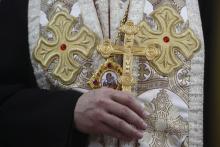
FATHER JACK MORRIS was one of those Catholic priests who ruined a lot of people for life. I'm one of them.
Father Morris passed away Sept. 30 in Spokane, Wash. He was working with the Catholic sisters and others who ran the highly regarded Copper Valley School in Alaska in the late 1950s when he took the idea of young people volunteering their time with and for Native Alaskans and helped turn it into the Jesuit Volunteer Corps. Since then, more than 12,000 people have served in the JVC, whose motto "ruined for life" reflects the fact that voluntary service often makes enduring changes in the way participants view the world. (A few years ago, Father Morris told Sojourners that the motto is "a resurrection statement"—through volunteering, he said, "you're transformed.")
I spent my first two years after college as a Jesuit Volunteer, first at the Oregon Center for Peace and Justice in Portland and then at Georgetown University's Center for Peace Studies. My mentor and boss in Portland was the center's director, Sister Michele Phiffer. She worked for years helping Catholics in Oregon understand the church's social teaching on the common good and the preferential option for people who are poor.
Perhaps needless to say, the local bishops weren't always on her side. In fact, it often appeared—even to my young eyes—that the bishops were more interested in protecting their own privilege and power than in genuinely working for the marginalized. And Sister Michele's gender seemed to be a factor in the lack of support she received from the episcopal powers that were.
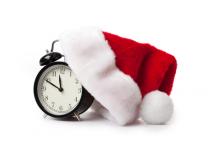
On the morning of Nov. 7, just hours after polling places closed and as votes continued to be counted, the national attention seemed to simultaneously switch from projected winners to the issues that deserved immediate attention. Instead of speculation surrounding which candidates may emerge victorious, many expressed the need for swift action on climate change, job creation, and education reform. The meticulous analysis of exit polls was abruptly replaced with calls for change surrounding immigration, taxes, and sustainable peace in the Middle East. Wwithin moments of receiving the news of Election Day winners, the general public swiftly switched its collective attention to matters of the immediate future.
In light of the various challenges facing our national and global community, there are indeed numerous issues that require the immediate attention of our elected officials. And our newly re-elected president, as well as others placed into public service, should be called upon for genuine cooperation, fair action, and immediate impact.
But while urgency is required in light of pressing concerns, an overindulgence of immediacy also contains a long list of shortcomings. Discipline and patience are required to bring forth intellectual depth, balanced consideration, and lasting compassion. As humans are more inclined to favor short-term over long-term rewards, the virtue of patience should be appreciated for its many worthwhile benefits.

As President Barack Obama prepares for a second term, immigration reform is rumored to be at the top of his agenda. With conservative opinion on the issue shifting, a unique opportunity exists to fix our nation’s broken immigration system. Americans are eager to see the president and Congress make progress on this unnecessarily vexing issue.
The record Latino voter turnout in support of President Obama played a key role in his electoral victory, as he won 71 percent of the vote compared with 27 percent for Gov. Mitt Romney.
These results have provided a catalyst for reenergizing the conversation around comprehensive immigration reform and paved the way for unexpected conversations among conservatives.

Three Buddhists, a Hindu, and a “none” will walk into the 113th Congress, and it’s no joke. Rather, it’s a series of “firsts” that reflect the growing religious diversity of the country.
When the new Congress is sworn in next January, Hawaii Democrat Tulsi Gabbard, an Iraq war veteran, will represent the state’s 2nd Congressional District and will become the first Hindu in either chamber on Capitol Hill.
The 31-year-old Gabbard was born in American Samoa to a Catholic father and a Hindu mother, and moved to Hawaii as a child. She follows the Vaishnava branch of Hinduism, which venerates the deity Lord Vishnu and his primary incarnations.
Gabbard takes over the seat held by Rep. Mazie K. Hirono, who won a Senate race on Nov. 6 and will become the first Buddhist to sit in the upper chamber. There were already two other Buddhists in the House of Representatives, both of whom won re-election: Rep. Hank Johnson, a Georgia Democrat, and Rep. Colleen Hanabusa, a fellow Hawaii Democrat.

In an attempt to make sense of the 2012 election and the unfolding David Petraeus sex scandal, I consulted the Bible and the Sayings of the Fathers, a collection of sage rabbinic teachings written between 200 B.C. and 200 A.D.
Turns out the ancient perceptions about politics and ethics are as insightful today as when they were first uttered.
I am appalled when clergy of any religion endorse candidates by name in the run-up to an election. Priests, ministers, rabbis and imams, of course, have every right to vote for any particular person they choose, thanks to the secret ballot. The clergy also have the right — indeed, the obligation — to discuss and debate the critical issues facing society. But religious leaders err and undermine their own authority when they publicly call for the election or defeat of a specific individual.
Last month “Pulpit Freedom Sunday” was sponsored by a group called the Alliance Defending Freedom. Nearly 1,500 Christian ministers openly backed various candidates as they tested the U.S. tax code, which forbids non-profit organizations (including houses of worship) from speaking out for or against political candidates. Such actions endanger their tax-exempt status, but the ADF sees that restriction as an incursion on freedom of religion and speech.

This starts as a question: What can I do now, as a citizen?
On Nov. 6, the answer was clear. Vote. Vote. Vote.
Well and done. Four years ago, too, I voted in November on Election Day, with a box of Fruity Cheerios under one arm.
In the weeks leading up to the election, my civic heart was tuned well. Watch the debates. Discuss. Then vote, because, actually, the pressure is quite enormous. Vote or Die. The Facebook news feed can crush you, flatten you into voting, which is all well and good. I can be for that. Civic pressure.
But come Nov. 7, the pressure released. The civic duty was fulfilled. And my question remains, sincerely. What can I do now?
I ask the question; one, because I do not know the answer; two, because I have an entirely different answer. So first, the question stands: What can I do now, as a citizen?
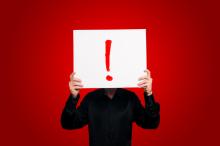
Last month, Lauren Anderson Youngblood, communications manager for the Secular Coalition for America, approached Broderick Johnson, a senior adviser to the Obama campaign, as they both left a conference on religion and the election.
The SCA is an umbrella group representing 11 nontheistic organizations. So who, Youngblood asked Johnson, could she reach out to with their concerns about civil rights, access to health care and education?
“He said, ‘We don’t view you as a constituency,’” Youngblood said. “He said, ‘We don’t do outreach to that community.’”
After Tuesday's election, that may soon change. According to a Pew Forum on Religion & Public Life study released last month, “nones” — those who say they have no religious affiliation or do not believe in God — are the fastest-growing faith group in America, at 20 percent of the population, or 46 million adults.
In addition, nationwide exit polls conducted Tuesday show that "nones" made up 12 percent of all voters — more than the combined number of voters who are Jewish, Muslim or members of other non-Christian faiths (9 percent), and only slightly smaller than the combined number of Hispanic Catholics and Black Protestants (14 percent).
We’re all accustomed to the electoral maps of the United States – blue states on both coasts and the upper Midwest, everywhere else a sea of red. We’ll be seeing them all evening. But what if the map were drawn with states scaled to size according to the outside money spent in them? NPR has a fascinating video that does it. It’s worth a look.
As millions of Americans wait in long lines to vote today, David Firestone wonders why it has to be so difficult.
“This is the day when voters raised on a reverence for democracy realize the utter disregard their leaders hold for that concept. The moment state and local officials around the country get elected, they stop caring about making it easy for their constituents to vote. Some do so deliberately, for partisan reasons, while others just don’t pay attention or decide they have bigger priorities.
“The result can be seen in the confusion, the breakdowns, and the agonizingly slow lines at thousands of precincts in almost every state.
“As they stand in windswept, hour-long lines to cast a ballot, voters might ask themselves, why are there so few polling places and workers? Why isn’t the government making it easier for me to vote, rather than forcing me through an endurance contest?”

THE TASTE OF the election still may be in our mouths—but Advent is breaking in.
Advent is a four-week stomp to Christmas. It is the time when God starts to show. God is pregnant during Advent: pregnant with possibilities that somehow, some way, someday, things will be different. They will taste better. We will know their taste better. We will be able to be engaged in our lives and our commitments and also be at peace. We will be the ones at the birthside, marveling about how God could dare come as a child or send heaven to earth, spirit to flesh, drenching humanity with divinity. The big words for this showing will be “Son of God” and “joy to the world.” The angels will sing, the night will go silent, the people will hark.
This Christmas would be a great time to notice what we have already seen: that when leaders and things get too large, when we put too much trust or hope in them, they revert to a brutal and brutalizing smallness. When we put trust in what we can notice, what we can do and who we can be, we are rarely disappointed. We expect, expectantly, as though we too were pregnant, day by day, with the possible.
For now, there is the waiting, the preparing for an Advent practice that will smell and taste good, that will open doors on more than a calendar.
I am an avid reader of women’s magazines, especially those that have a centerfold of the perfect Christmas dinner. I praise that dinner, hope for it, plan for it, and then eat with vigor what really comes out. A friend has a sign on her refrigerator about the difference between what we usually have and what the magazine announced: “It’s not going to happen that way.” By that sign, she is preparing herself for a day and a life of surprises. She is grooming her “to don’t” list.
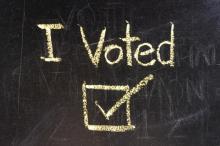
For the next 12 days it’s all about the ground game. With most voter registration deadlines passed, the fight against voter suppression has shifted focus from registration drives to calling banks, car-pools, and calls to vote early.
Bishop Dwayne Royster is Executive Director of P.O.W.E.R. (Philadelphians Organized to Witness Empower and Rebuild), a 37-member interfaith organizing coalition in Philadelphia. Royster is also lead pastor of Living Waters United Church of Christ in Philadelphia. In a recent interview Bishop Royster explained just how vital the fight against voter suppression has been for the people of Philadelphia.
According to a study conducted by the Pew Charitable Trust’s Philadelphia Research Initiative, Philadelphia is the 6th poorest large city in America with a poverty rate that held at 25 percent in 2011. The unemployment rate is higher than the national average at 11.5 percent, and nearly half of all high school students engage in a fist fight at least once in the course of a year. Tensions are high in the City of Brotherly Love.
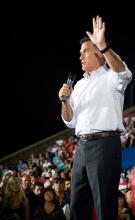
The Romney-Ryan ticket is the first Republican presidential campaign in history without a Protestant candidate, but this hasn't deterred evangelicals from launching massive get-out-the-vote and registration efforts to help Mitt Romney and Paul Ryan win the White House.
Faith and Freedom Coalition founder Ralph Reed, who has been involved in pushing evangelicals to the polls since 1988, has launched what he described as the "largest voter registration, voter mobilization and get-out-the-vote effort ever targeted at evangelical voters," specifically those who would be new additions to the voter rolls.
Reed's effort targets not only presidential swing states but also those with critical Senate and House races to help elect conservatives down ballot as well.
Working with third-party contractors, Reed and his group were able to identify and mail voter registration packets to slightly less than 2 million unregistered evangelicals based on everything from Census data to television preferences to what books they may have purchased online.
"There are millions of Bibles purchased in the United States every month. Most people aren't interested in finding out who is buying those Bibles — I am," Reed said.
Reed said he has a voter file of 17 million evangelicals in battleground states, and each household will be contacted seven to 12 times before the election through mail, email, phone calls and text messages.
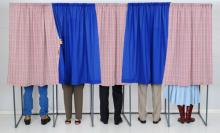
In a few weeks citizens will choose who serves as president of the United States. As many from all sides of the political spectrum have already recognized, the nationwide decision of Nov. 6 will affect the direction of 50 states – as well as the international community – for generations to come.
Since the opposing candidates offer contrasting views for the future, the choice is indeed critical, thus all are encouraged to listen openly and attentively, critique the various policy positions carefully, and when the first Tuesday of November arrives, make an informed choice for the collective benefit of our global common good.
While one should affirm and appreciate the importance of Election Day, we should also recognize and appreciate our ability to shape society far more frequently than once every four years. While several years pass between presidential elections, we vote for the collective benefit of our global common good on numerous occasions with each passing day.
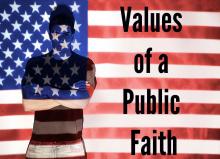
Editor's Note: This is part two of a three-part series from Dr. Miroslav Volf an a voice instructing us how to involve our values into our present politcal debates. To read part one go HERE. From part one:
In this year of presidential elections, I have decided to summarize key values that guide me as I decide for whom to cast my vote. ...
6. The Poor
Value: The poor — above all those without adequate food or shelter — deserve our special concern. (“The moral test of government is how it treats people in the dawn of life, the children, in the twilight of life, the aged, and in the shadows of life, the sick, the needy, and the handicapped” [Hubert Humphrey].)
Rationale: “When you reap the harvest of your land, you shall not reap to the very edges of your field, or gather the gleanings of your harvest; you shall leave them for the poor and for the alien: I am the LORD your God” (Lev. 23:22). “There will, however, be no one in need among you, because the LORD is sure to bless you in the land that the LORD your God is giving you as a possession to occupy” (Deut. 15:4).
Debate: There should be no debate whether fighting extreme poverty is a top priority of the government. That’s a given. We should debate the following: How should we generate a sense of solidarity with the poor among all citizens? In poverty alleviation, what is the proper role of governments and of individuals, religious communities, and civic organizations? What macroeconomic conditions most favor lifting people out of poverty? What should the minimum wage be?
Questions to Ask: Is overcoming extreme poverty (rather than fostering the wellbeing of the middle class) a priority for the candidate? For what poverty-reducing policies is the candidate prepared to fight?